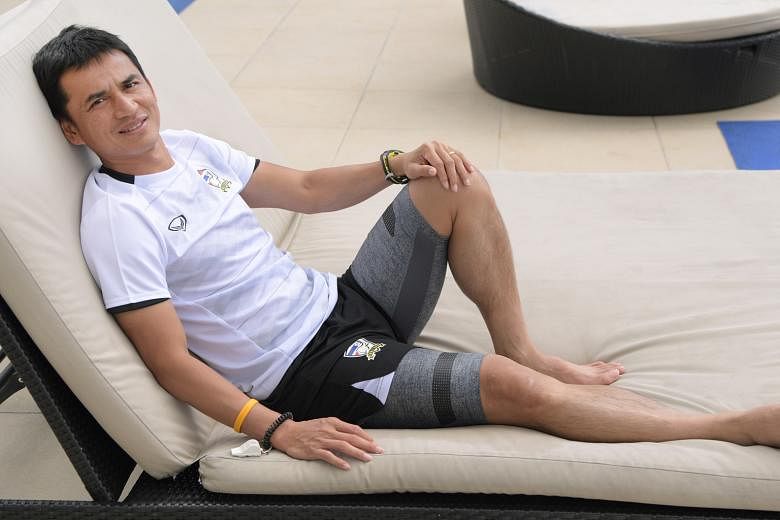Dipped in the fountain of youth, touched by the football gods, at 43, a shirtless Kiatisuk Senamuang still looks like a fit, young footballer.
But he is not. Sunning himself by the pool at Manila's Novotel Araneta hotel, Thailand's former star striker is now its national coach.
It is a role he plays as easily as he did scoring goals in his prime.
He has big dreams for this special generation, Kiatisuk tells The Straits Times. "When I became the national coach in 2014, I could have called up the experienced players like Datsakorn Thonglao and Rungsan Viwatchaichok.
"I felt it was time to change. The team I called up then has an average age of 22 and I want to build them up. I believe they can last for the next 10 years."
The War Elephants duly won the biennial Asean Football Federation (AFF) competition in his first year in charge. They are already clear favourites to make it two in a row after breezing through Group A with three consecutive wins.
But Kiatisuk, nicknamed "Zico" for his Brazilian technique during his playing days with Rajpracha and Royal Thai Police in his homeland, Huddersfield in England, Hoang Anh Gia Lai in Vietnam and the S-League's Warriors FC, wants his team to do it in style.
Apart from individual skills, what sets this Thailand team apart is their quick passing and movement, an adaptation of the Spanish tiki-taka that Kiatisuk named "tik-tok" to express his philosophy. From back to front, the ball is pinged around in rhythmic pulses.
And it is the tactician's pragmatism that led to this style.
"I look at our players and it is obvious they are small-sized, like myself," Kiatisuk explained.
"We are not Europeans, there is no point playing long balls. But we can win if our possession is good. However, if we hold on to the ball too much, we will get tackled. We must be quick. Get the ball, quick, pass, receive, quick, pass... that's tik-tok. No one can injure or tackle you if you pass fast.
"Imagine Jay (attacking midfielder Chanathip Songkrasin) as a Ferrari. A Ferrari is fast but if it is speeding towards the barrier, who will win? The barrier, of course. That's why he must release the ball quickly because so many bigger players want to tackle him."
One such example - a flowing 27-pass sequence in the 2014 AFF Cup final that lacked only a goal to cap it off - is preserved for posterity on YouTube.
But regional dominance is not enough for Kiatisuk. The world No. 129 Thais are Asean's lone survivors in the 2018 World Cup qualifiers. Having reached the third round they bring up the rear in Group B. Their 2-2 draw against 48th-ranked Australia remains a highlight.
Kiatisuk said: "We will try to be a top 10 country in Asia. We are 19th now and not too far away."
He can count on his exciting young team, with the bulk of the players aged 23-26. He noted: "What makes us special is our unity. I have been looking after this generation of players since I became the SEA Games coach in 2013."
That year, Thailand won gold to end a mini-drought of two barren tournaments (2009 and 2011).
But for Kiatisuk, the breakthrough came thanks to a courageous run to the 2014 Asian Games semi-finals. The Thais topped their round-robin group (Indonesia, Maldives and Timor Leste) with three wins, scoring 11 goals without reply. They eliminated China (round of 16) and Jordan (quarter-finals) before hosts South Korea halted their fairy-tale campaign.
He said: "The players became famous even though we didn't come home with any trophy or medals."
Indeed, sports brands, fashion labels, electronic goods, food and beverage companies and many others came onboard to plaster these players, and Zico himself, on advertising billboards all over the country.
The coach is an A-list celebrity at home. Always friendly, always obliging, he takes the effort to like and comment the posts made by his one million Instagram followers.
He said: "Previously, if Thai sponsors are looking for faces to present their products, they would go for singers and actors. Now, they are looking for footballers. It is good for young Thai people because they now know that if they train hard, they can be a big star and see their face in commercials."
But he has a stern side. Any Thai player found breaking his four golden rules will be dismissed.
"No drinking. No smoking. No partying. No gambling or card games. If my staff, the media or myself catch them ignoring this code of conduct, they have to pack their backs immediately and go home," he intoned.
"I try to be like a teacher to the team. Day by day, game by game... we continue.
"The World Cup third round showed that we have individual quality, we have good technique. But we can learn more because teams like Japan have much higher standards.
"Yes, it will be a dream come true to win the Asian Cup. We can always try."


